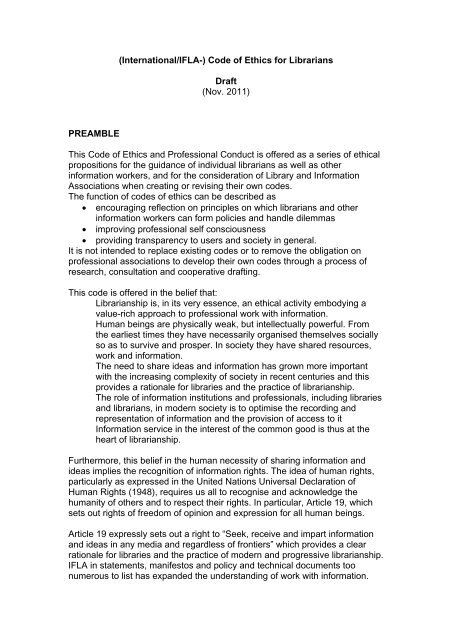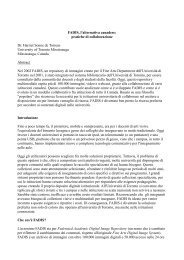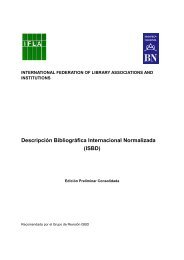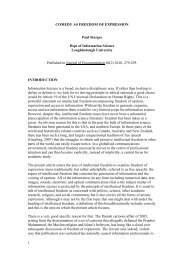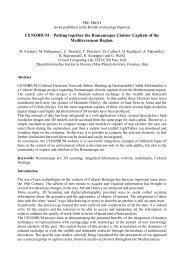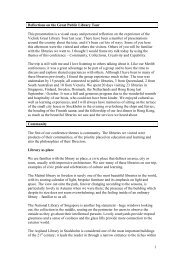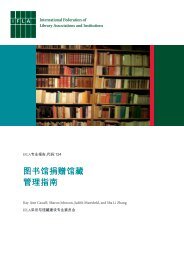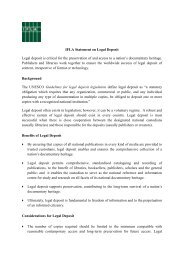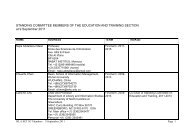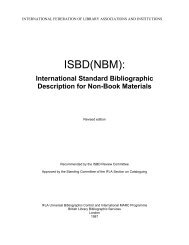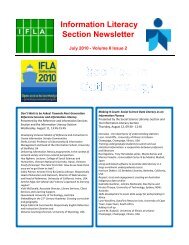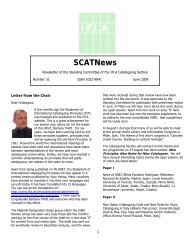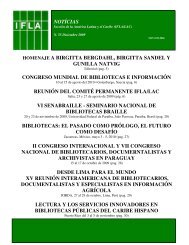(International/IFLA-) Code of Ethics for Librarians Draft (Nov. 2011 ...
(International/IFLA-) Code of Ethics for Librarians Draft (Nov. 2011 ...
(International/IFLA-) Code of Ethics for Librarians Draft (Nov. 2011 ...
You also want an ePaper? Increase the reach of your titles
YUMPU automatically turns print PDFs into web optimized ePapers that Google loves.
(<strong>International</strong>/<strong>IFLA</strong>-) <strong>Code</strong> <strong>of</strong> <strong>Ethics</strong> <strong>for</strong> <strong>Librarians</strong><br />
<strong>Draft</strong><br />
(<strong>Nov</strong>. <strong>2011</strong>)<br />
PREAMBLE<br />
This <strong>Code</strong> <strong>of</strong> <strong>Ethics</strong> and Pr<strong>of</strong>essional Conduct is <strong>of</strong>fered as a series <strong>of</strong> ethical<br />
propositions <strong>for</strong> the guidance <strong>of</strong> individual librarians as well as other<br />
in<strong>for</strong>mation workers, and <strong>for</strong> the consideration <strong>of</strong> Library and In<strong>for</strong>mation<br />
Associations when creating or revising their own codes.<br />
The function <strong>of</strong> codes <strong>of</strong> ethics can be described as<br />
• encouraging reflection on principles on which librarians and other<br />
in<strong>for</strong>mation workers can <strong>for</strong>m policies and handle dilemmas<br />
• improving pr<strong>of</strong>essional self consciousness<br />
• providing transparency to users and society in general.<br />
It is not intended to replace existing codes or to remove the obligation on<br />
pr<strong>of</strong>essional associations to develop their own codes through a process <strong>of</strong><br />
research, consultation and cooperative drafting.<br />
This code is <strong>of</strong>fered in the belief that:<br />
<strong>Librarians</strong>hip is, in its very essence, an ethical activity embodying a<br />
value-rich approach to pr<strong>of</strong>essional work with in<strong>for</strong>mation.<br />
Human beings are physically weak, but intellectually powerful. From<br />
the earliest times they have necessarily organised themselves socially<br />
so as to survive and prosper. In society they have shared resources,<br />
work and in<strong>for</strong>mation.<br />
The need to share ideas and in<strong>for</strong>mation has grown more important<br />
with the increasing complexity <strong>of</strong> society in recent centuries and this<br />
provides a rationale <strong>for</strong> libraries and the practice <strong>of</strong> librarianship.<br />
The role <strong>of</strong> in<strong>for</strong>mation institutions and pr<strong>of</strong>essionals, including libraries<br />
and librarians, in modern society is to optimise the recording and<br />
representation <strong>of</strong> in<strong>for</strong>mation and the provision <strong>of</strong> access to it<br />
In<strong>for</strong>mation service in the interest <strong>of</strong> the common good is thus at the<br />
heart <strong>of</strong> librarianship.<br />
Furthermore, this belief in the human necessity <strong>of</strong> sharing in<strong>for</strong>mation and<br />
ideas implies the recognition <strong>of</strong> in<strong>for</strong>mation rights. The idea <strong>of</strong> human rights,<br />
particularly as expressed in the United Nations Universal Declaration <strong>of</strong><br />
Human Rights (1948), requires us all to recognise and acknowledge the<br />
humanity <strong>of</strong> others and to respect their rights. In particular, Article 19, which<br />
sets out rights <strong>of</strong> freedom <strong>of</strong> opinion and expression <strong>for</strong> all human beings.<br />
Article 19 expressly sets out a right to “Seek, receive and impart in<strong>for</strong>mation<br />
and ideas in any media and regardless <strong>of</strong> frontiers” which provides a clear<br />
rationale <strong>for</strong> libraries and the practice <strong>of</strong> modern and progressive librarianship.<br />
<strong>IFLA</strong> in statements, manifestos and policy and technical documents too<br />
numerous to list has expanded the understanding <strong>of</strong> work with in<strong>for</strong>mation.
Implicit in this work is the idea <strong>of</strong> in<strong>for</strong>mation rights and their significance <strong>for</strong><br />
the pr<strong>of</strong>ession and society generally. The emphasis on in<strong>for</strong>mation rights in<br />
turn obliges librarians and other in<strong>for</strong>mation workers to develop a principled<br />
critique <strong>of</strong> relevant law and to be prepared to advise and, if appropriate,<br />
advocate the improvement <strong>of</strong> both the substance and administration <strong>of</strong> laws.<br />
The clauses <strong>of</strong> this code <strong>of</strong> ethics build on the core principles outlined in this<br />
preamble to provide a set <strong>of</strong> suggestions on the conduct <strong>of</strong> pr<strong>of</strong>essionals.<br />
<strong>IFLA</strong> recognises that whilst these core principles should remain at the heart <strong>of</strong><br />
any such code, the specifics <strong>of</strong> codes will necessarily vary according to the<br />
particular society, community <strong>of</strong> practice or virtual community. <strong>Code</strong> making is<br />
an essential function <strong>of</strong> a pr<strong>of</strong>essional association, just as ethical reflection is<br />
a necessity <strong>for</strong> all pr<strong>of</strong>essionals. <strong>IFLA</strong> recommends the <strong>Code</strong> <strong>of</strong> <strong>Ethics</strong> <strong>for</strong><br />
<strong>IFLA</strong> to all its member associations and institutions and to individual librarians<br />
and in<strong>for</strong>mation workers <strong>for</strong> these purposes. Furthermore <strong>IFLA</strong> undertakes to<br />
revise this code whenever appropriate.<br />
ACCESS TO INFORMATION<br />
The core mission <strong>of</strong> librarians, other in<strong>for</strong>mation workers and their institutions<br />
is to ensure access to in<strong>for</strong>mation <strong>for</strong> all <strong>for</strong> personal development, education,<br />
cultural enrichment, economic activity and in<strong>for</strong>med participation in and<br />
enhancement <strong>of</strong> democracy.<br />
<strong>Librarians</strong>, other in<strong>for</strong>mation workers and their institutions reject the denial<br />
and restriction <strong>of</strong> access to in<strong>for</strong>mation and ideas most particularly through<br />
censorship whether by states, governments, or religious or civil society<br />
institutions. Policies on collection development and access to in<strong>for</strong>mation<br />
should be made explicit, transparent and freely available.<br />
Libraries <strong>of</strong>fering services to the public should make every endeavour to <strong>of</strong>fer<br />
access to their collections and services free <strong>of</strong> cost to the user. If membership<br />
fees and administrative charges are inevitable, they should be kept as low as<br />
possible, and practical solutions found so that socially disadvantaged people<br />
are not excluded.<br />
<strong>Librarians</strong>, other in<strong>for</strong>mation workers and their institutions promote and<br />
publicise their collection and services so that users and prospective users are<br />
aware <strong>of</strong> their existence and availability. In<strong>for</strong>mation pr<strong>of</strong>essionals and their<br />
institutions use the most effective ways to make the material accessible to all.<br />
The websites <strong>of</strong> libraries and related institutions should comply with<br />
international standards <strong>for</strong> accessibility and access to them should not be<br />
subject to barriers.
USERS’ RIGHTS<br />
In order to provide inclusion and eradicate discrimination, librarians shall<br />
ensure that the right <strong>of</strong> accessing in<strong>for</strong>mation is not denied <strong>for</strong> reasons such<br />
as age, citizenship, political belief, physical or mental disability, gender,<br />
immigration legal status, marital status, origin, race, religion, sexual<br />
orientation or gender identity.<br />
<strong>Librarians</strong> and their institutions shall establish policies to guide the provision<br />
<strong>of</strong> equitable access and services to all customers including individuals and<br />
groups, agencies, institutions and organizations, native and <strong>for</strong>eign-speakers,<br />
and those who need access to in<strong>for</strong>mation in various <strong>for</strong>mats.<br />
<strong>Librarians</strong> and their institutions shall uphold individuals' rights to privacy and<br />
confidentiality regarding access to in<strong>for</strong>mation in any <strong>for</strong>mat, and services<br />
provided and/or, used.<br />
<strong>Librarians</strong> shall provide unbiased services reflecting respect <strong>for</strong> users and<br />
equal access to in<strong>for</strong>mation.<br />
<strong>Librarians</strong> organize and present content in a way that allows an autonomous<br />
user to find the in<strong>for</strong>mation he/she needs. <strong>Librarians</strong> help and support their<br />
users in their in<strong>for</strong>mation search.<br />
PRIVACY, SECRECY AND TRANSPARENCY<br />
<strong>Librarians</strong> and their institutions promote openness <strong>of</strong> access to ideas and the<br />
maximum transparency <strong>for</strong> in<strong>for</strong>mation that is compatible with good<br />
governance and human rights.<br />
They respect the personal privacy <strong>of</strong> all, except where it is in the public<br />
interest that misconduct, corruption and crime be exposed. Furthermore they<br />
respect the protection <strong>of</strong> personal data, necessarily shared between<br />
individuals and institutions.<br />
<strong>Librarians</strong> support transparency so that the workings <strong>of</strong> government,<br />
administration and business are exposed to the scrutiny <strong>of</strong> the general public,<br />
whose lives are vitally affected by those workings thereby holding these<br />
entities accountable <strong>for</strong> their action.<br />
<strong>Librarians</strong> recognise that from time to time principled en<strong>for</strong>cement <strong>of</strong> unwilling<br />
transparency in the <strong>for</strong>m <strong>of</strong> leaks by whistleblowers will further the values <strong>of</strong><br />
civil society, whether revelations are in strict con<strong>for</strong>mity to law, regulations<br />
and contracts or not.<br />
At the same time librarians recognise that there is a legitimate sphere <strong>of</strong><br />
government, business and industrial secrecy that will under certain<br />
circumstances and <strong>for</strong> limited periods <strong>of</strong> time restrict access to carefully<br />
defined and limited categories and items <strong>of</strong> in<strong>for</strong>mation, and the role <strong>of</strong><br />
librarians serving government agencies and corporations may from time to<br />
time contribute towards such necessary concealment.<br />
<strong>Librarians</strong> respect confidentiality agreements taken on behalf <strong>of</strong> the library<br />
and between third parties while ensuring that such agreements do not go<br />
beyond that a<strong>for</strong>ementioned “legitimate sphere” The relationship between the<br />
library and the user is to be regarded as one <strong>of</strong> confidentiality and librarians
OPEN ACCESS AND INTELLECTUAL PROPERTY<br />
<strong>Librarians</strong> and their institutions are partners <strong>of</strong> authors, publishers and other<br />
creators <strong>of</strong> copyright protected works. <strong>Librarians</strong>’ interest is to provide the<br />
best possible access <strong>for</strong> library users to in<strong>for</strong>mation and ideas in any media or<br />
<strong>for</strong>mat.<br />
<strong>Librarians</strong> will promote the principles <strong>of</strong> Open Access, Open Source, Open<br />
licenses and other means <strong>of</strong> providing fair, swift, economical and effective<br />
access to in<strong>for</strong>mation <strong>for</strong> users.<br />
<strong>Librarians</strong> recognise the intellectual property right <strong>of</strong> authors and other<br />
creators and will seek to ensure that their moral rights are respected as<br />
completely as possible so that they get the recognition that their creativity<br />
deserves.<br />
<strong>Librarians</strong> also recognise that creators deserve financial reward <strong>for</strong> their<br />
creativity and there<strong>for</strong>e support the protection <strong>of</strong> their copyright protected<br />
works <strong>of</strong>fered by Article 27 <strong>of</strong> the United Nations Universal Declaration <strong>of</strong><br />
Human Rights.<br />
<strong>Librarians</strong> will negotiate the most favourable licence and purchase terms <strong>for</strong><br />
access to works with rights holders, on behalf <strong>of</strong> their users and seek to<br />
ensure that access is not unnecessarily prevented or hindered by the mode <strong>of</strong><br />
administration <strong>of</strong> intellectual property laws.<br />
It is the duty <strong>of</strong> the library and in<strong>for</strong>mation pr<strong>of</strong>ession in individual countries to<br />
develop a critical analysis <strong>of</strong> the applicable intellectual property regime,<br />
nationally and internationally, and to advocate <strong>for</strong> change and improvement<br />
when appropriate. It is also the pr<strong>of</strong>ession’s duty to advocate <strong>for</strong> exceptions<br />
and limitations to copyright restrictions <strong>for</strong> libraries.<br />
<strong>Librarians</strong> will seek to encourage governments to establish an intellectual<br />
property regime that favours the development and protection <strong>of</strong> creativity, and<br />
to negotiate international trade agreements that are not injurious to an author<br />
<strong>of</strong> a literary or artistic work.<br />
<strong>Librarians</strong> should also advocate that copyright restrictions should not be<br />
expanded beyond a reasonable time limitation.<br />
<strong>Librarians</strong> ensure that in<strong>for</strong>mation that has fallen in the public domain remains<br />
public and free.<br />
COLLEAGUE AND EMPLOYER/EMPLOYEE RELATIONSHIP<br />
<strong>Librarians</strong> shall treat each other with fairness and respect.<br />
Employers shall not discriminate in any aspect <strong>of</strong> employment because <strong>of</strong><br />
age, citizenship, political belief, physical or mental disability, gender, marital<br />
status, origin, race, religion, sexual orientation or gender identity.<br />
Employers shall provide working conditions promoting equal opportunities <strong>for</strong><br />
all librarians. <strong>Librarians</strong> shall have the right to free speech in the workplace<br />
provided it does not infringe on the principle <strong>of</strong> neutrality vis-a-vis the users.<br />
Employers shall provide equal payment and benefits <strong>for</strong> men and women<br />
holding similar types <strong>of</strong> jobs.
<strong>Librarians</strong> shall be ready to share their pr<strong>of</strong>essional experience with<br />
colleagues.<br />
<strong>Librarians</strong> shall help and guide young pr<strong>of</strong>essionals to enter pr<strong>of</strong>essional<br />
community.<br />
<strong>Librarians</strong> shall comply with the principle <strong>of</strong> confidentiality <strong>of</strong> personal<br />
in<strong>for</strong>mation in relations with colleagues.<br />
<strong>Librarians</strong> strive to earn own reputation by means <strong>of</strong> pr<strong>of</strong>essionalism and<br />
moral characters, does not use unfair methods <strong>of</strong> competition.


